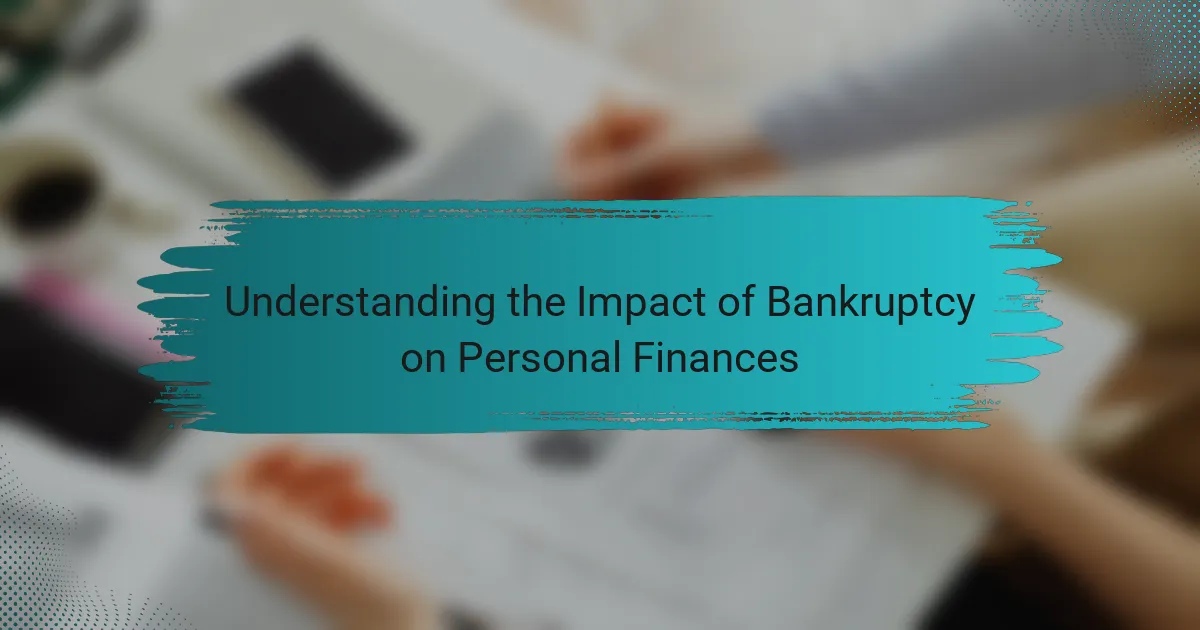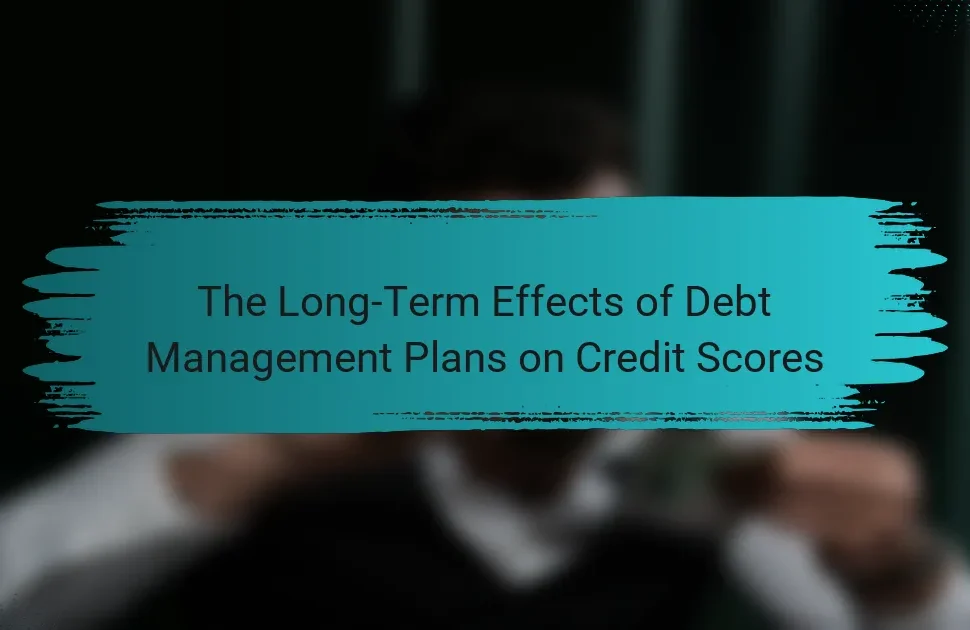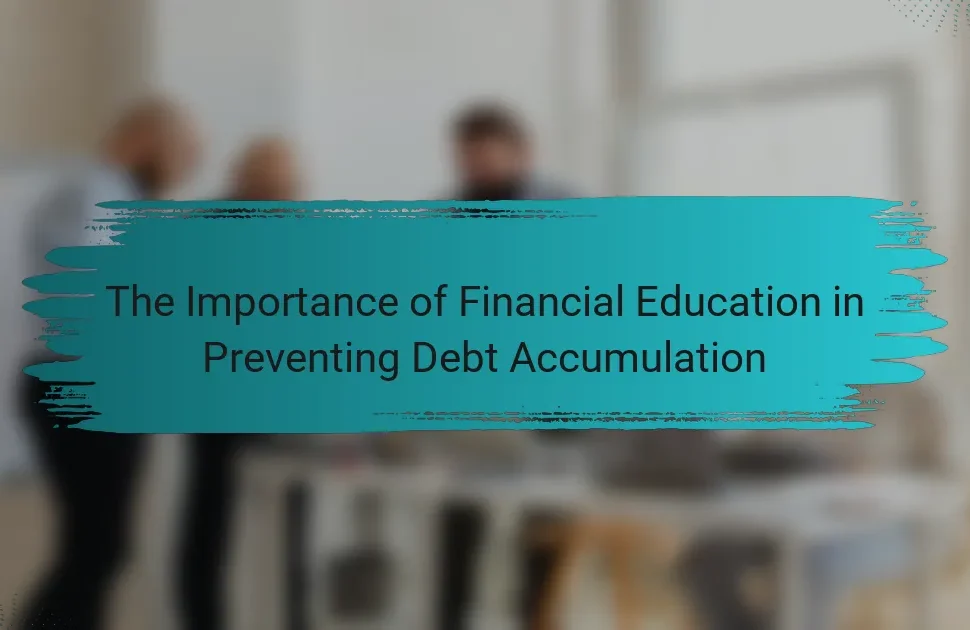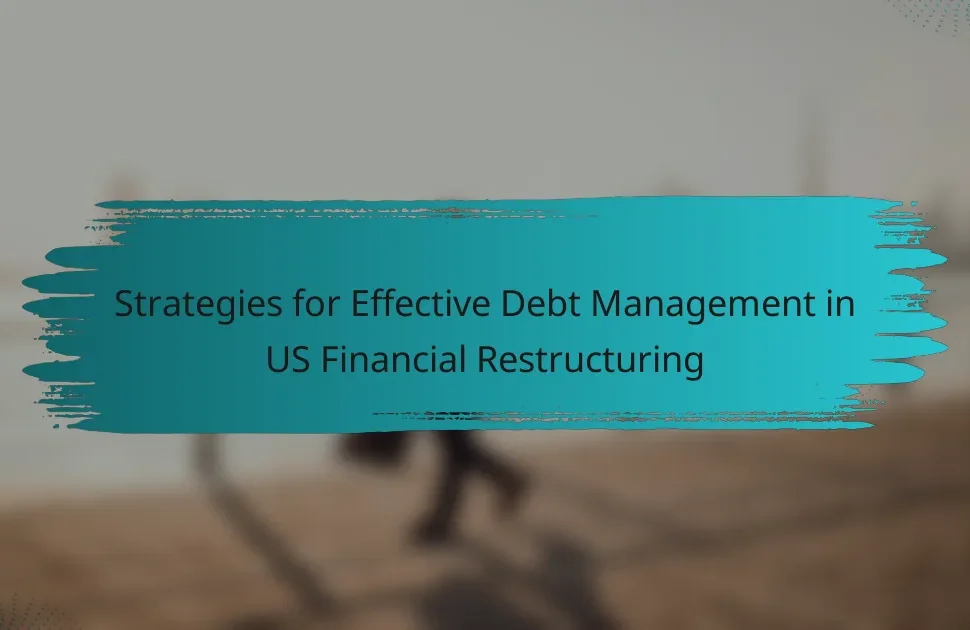Bankruptcy is a legal process that enables individuals or businesses to eliminate or repay debts, providing a potential fresh start for those facing financial distress. The implications of bankruptcy on personal finances are significant, including the potential discharge of unsecured debts and the risk of asset loss, depending on the type of bankruptcy filed. Additionally, bankruptcy can drastically affect credit scores, with a Chapter 7 filing potentially reducing scores by 130 to 240 points and remaining on credit reports for up to ten years. This can complicate future borrowing and lead to higher interest rates or credit denials. Understanding these consequences is essential for anyone considering bankruptcy, along with strategies for rebuilding credit and achieving financial stability post-bankruptcy.
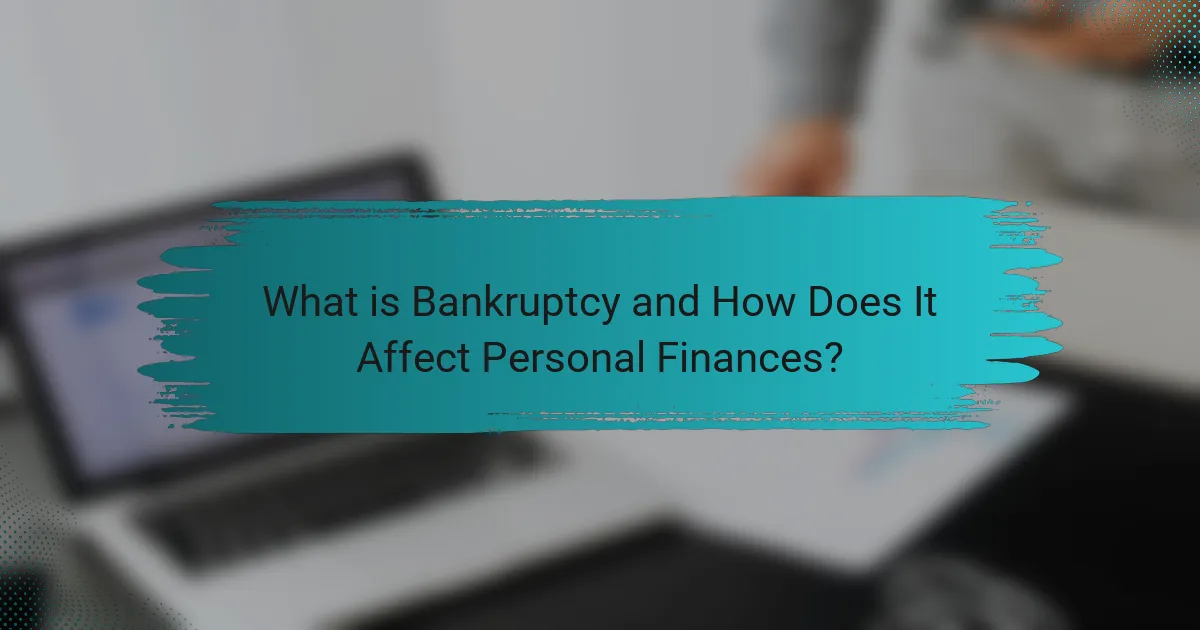
What is Bankruptcy and How Does It Affect Personal Finances?
Bankruptcy is a legal process that allows individuals or businesses to eliminate or repay some or all of their debts. It provides a fresh start for those overwhelmed by financial obligations. Personal finances are significantly affected by bankruptcy. It can lead to the discharge of unsecured debts, like credit card balances. However, bankruptcy can also result in the loss of assets, depending on the type filed.
Additionally, it can severely impact credit scores, making future borrowing more difficult. For instance, bankruptcy can stay on a credit report for up to ten years. This can lead to higher interest rates for loans or credit. Understanding these implications is crucial for individuals considering this option.
What are the different types of bankruptcy available for individuals?
The different types of bankruptcy available for individuals are Chapter 7 and Chapter 13. Chapter 7 bankruptcy is a liquidation process. It involves selling non-exempt assets to pay creditors. This type usually discharges most unsecured debts. Chapter 13 bankruptcy is a reorganization process. It allows individuals to create a repayment plan over three to five years. This type enables individuals to keep their assets while repaying debts. According to the U.S. Courts, these two types are the most common for personal bankruptcy filings.
How does Chapter 7 bankruptcy work in relation to personal finances?
Chapter 7 bankruptcy allows individuals to discharge most unsecured debts. This process provides a fresh financial start by eliminating debts like credit card balances and medical bills. To qualify, individuals must pass a means test assessing their income and expenses. If eligible, they must file a petition in bankruptcy court. The court appoints a trustee to oversee the case and liquidate non-exempt assets. Exempt assets may include necessary household items, certain retirement accounts, and equity in a home up to a specified limit. The discharge typically occurs within three to six months after filing. This bankruptcy type can significantly impact credit scores, remaining on credit reports for up to ten years.
What are the implications of Chapter 13 bankruptcy on financial obligations?
Chapter 13 bankruptcy allows individuals to restructure their debts while maintaining assets. It enables debtors to create a repayment plan to pay back creditors over three to five years. During this period, most financial obligations are temporarily halted due to an automatic stay. This stay prevents creditors from pursuing collection actions while the repayment plan is in effect.
Debtors typically must make regular payments to a bankruptcy trustee, who distributes funds to creditors. Unsecured debts may be reduced or discharged, depending on the repayment plan’s terms. However, secured debts, like mortgages or car loans, generally must be paid in full.
Failure to adhere to the repayment plan can lead to dismissal of the bankruptcy case. This dismissal can reinstate all original financial obligations, including collection actions by creditors. Therefore, Chapter 13 bankruptcy significantly impacts financial obligations by altering repayment terms and providing temporary relief from collections.
Why do individuals consider filing for bankruptcy?
Individuals consider filing for bankruptcy primarily to alleviate overwhelming debt. This legal process provides a way to discharge certain debts or create a manageable repayment plan. Many individuals face financial difficulties due to job loss, medical expenses, or divorce. According to a report by the American Bankruptcy Institute, medical debt is a leading cause of bankruptcy filings. Furthermore, bankruptcy can halt creditor harassment and foreclosure actions. It offers individuals a fresh financial start, allowing them to rebuild their credit over time. Ultimately, bankruptcy serves as a vital option for those unable to meet their financial obligations.
What common financial challenges lead to bankruptcy filings?
Common financial challenges that lead to bankruptcy filings include overwhelming medical expenses, job loss, and excessive debt. Medical bills can accumulate rapidly, often exceeding insurance coverage limits. Job loss reduces income, making it difficult to meet financial obligations. Excessive debt from credit cards or loans can lead to unmanageable monthly payments. According to the American Bankruptcy Institute, medical debt is a significant factor in nearly 66.5% of personal bankruptcies. Unemployment rates also correlate with increased bankruptcy filings, as seen during economic downturns. These challenges demonstrate how financial strain can push individuals toward bankruptcy as a last resort.
How does debt accumulation influence the decision to declare bankruptcy?
Debt accumulation significantly influences the decision to declare bankruptcy. As individuals accumulate more debt, they may face increased financial strain. This strain can lead to an inability to meet monthly payments. When debts exceed income, individuals often consider bankruptcy as a viable solution. Statistics show that over 750,000 bankruptcy filings occur annually in the U.S., often driven by overwhelming debt. Additionally, high levels of unsecured debt, such as credit card balances, are commonly associated with bankruptcy filings. In many cases, the pressure from creditors can push individuals toward this decision. Ultimately, rising debt levels can create a scenario where bankruptcy becomes the only option for financial relief.
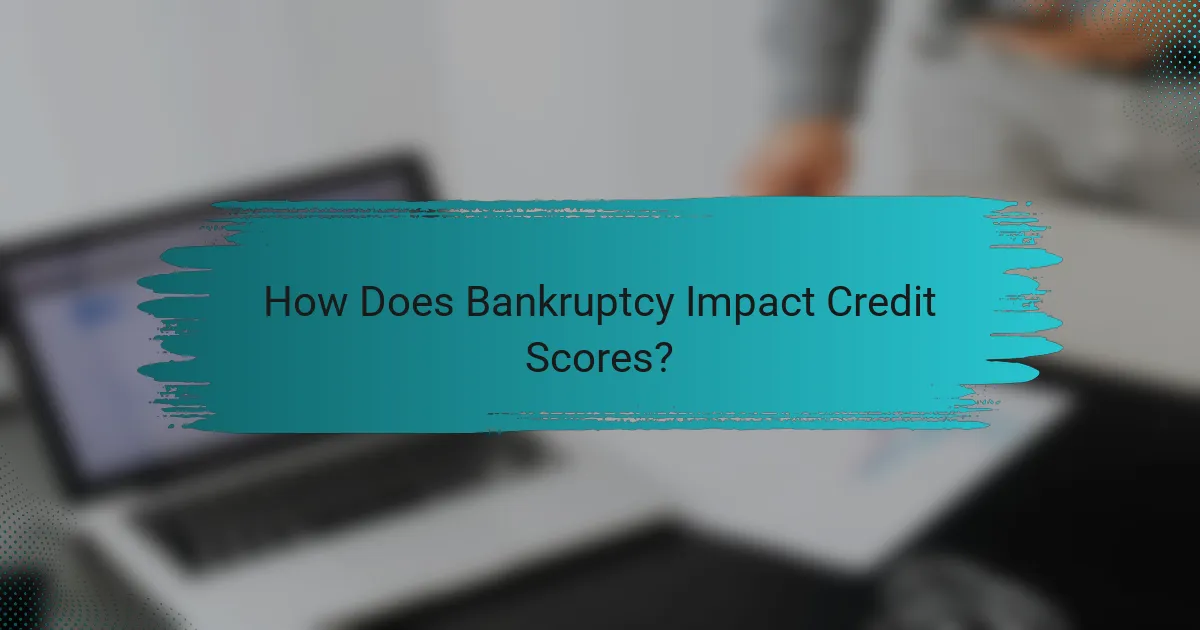
How Does Bankruptcy Impact Credit Scores?
Bankruptcy significantly lowers credit scores. A Chapter 7 bankruptcy can reduce a credit score by 130 to 240 points. This impact is often felt immediately after filing. The bankruptcy remains on a credit report for up to 10 years. During this time, obtaining new credit becomes more challenging. Lenders view bankruptcy as a sign of high risk. This can lead to higher interest rates or outright denial of credit applications. Rebuilding credit after bankruptcy is possible but requires time and responsible financial behavior.
What are the short-term effects of bankruptcy on credit ratings?
Bankruptcy negatively impacts credit ratings in the short term. Typically, a bankruptcy filing can lower a credit score by 130 to 240 points. This drop occurs because bankruptcy is considered a major derogatory event. Creditors view it as a sign of financial distress. The bankruptcy remains on a credit report for up to ten years. During this time, obtaining new credit may be difficult. Interest rates on loans may also be higher for individuals with recent bankruptcies. Overall, the short-term effects include significant score reduction and limited access to credit.
How long does bankruptcy remain on a credit report?
Bankruptcy remains on a credit report for up to 10 years. This duration applies to Chapter 7 bankruptcy filings. For Chapter 13 bankruptcy, it typically remains for 7 years. The time frame begins from the date of filing. Credit reporting agencies adhere to these timelines. This information is standardized under the Fair Credit Reporting Act.
What factors determine the extent of credit score damage after bankruptcy?
The extent of credit score damage after bankruptcy is determined by several key factors. The type of bankruptcy filed significantly influences the score. Chapter 7 bankruptcy typically causes more severe damage than Chapter 13. The duration since the bankruptcy filing also plays a role. Credit scores improve over time as negative marks age. The individual’s credit history prior to bankruptcy affects the outcome as well. A previously high score may experience a greater drop. The number of accounts included in the bankruptcy is another factor. More accounts can lead to a larger score decrease. Lastly, the overall credit utilization ratio impacts recovery. Lower utilization can help rebuild the score post-bankruptcy.
What steps can individuals take to rebuild their credit post-bankruptcy?
Individuals can rebuild their credit post-bankruptcy by following several key steps. First, they should obtain a copy of their credit report. This helps identify any remaining debts and errors. Next, individuals should pay all bills on time. Timely payments are crucial for improving credit scores.
Additionally, they can consider applying for a secured credit card. These cards require a cash deposit as collateral. Using them responsibly can help demonstrate creditworthiness. Individuals should also keep credit utilization low. This means using less than 30% of available credit limits.
Furthermore, they should avoid opening too many new accounts at once. Each application can negatively impact credit scores. Lastly, individuals can monitor their credit regularly. This helps track improvements and correct any inaccuracies. Following these steps can significantly aid in rebuilding credit after bankruptcy.
How can secure credit cards assist in credit recovery?
Secure credit cards can assist in credit recovery by providing a means to rebuild credit scores. They require a cash deposit that serves as collateral, which minimizes risk for lenders. Users can make regular purchases and payments, demonstrating responsible credit behavior. Timely payments on secure credit cards positively impact credit reports. This can lead to improved credit scores over time. According to a study by Experian, individuals who use secured credit cards responsibly can see significant score increases within six months. This makes secure credit cards an effective tool for those recovering from bankruptcy.
What role do timely payments play in rebuilding credit scores?
Timely payments are crucial for rebuilding credit scores. They account for approximately 35% of a credit score calculation. Consistently making payments on time demonstrates financial responsibility to credit bureaus. This positive behavior can lead to an increase in credit scores over time. For example, a study by FICO indicates that individuals who consistently pay on time can see their scores rise significantly within a few months. Additionally, timely payments help establish a positive payment history, which is essential for lenders assessing creditworthiness. Therefore, making timely payments is a fundamental step in the process of credit score recovery after bankruptcy.
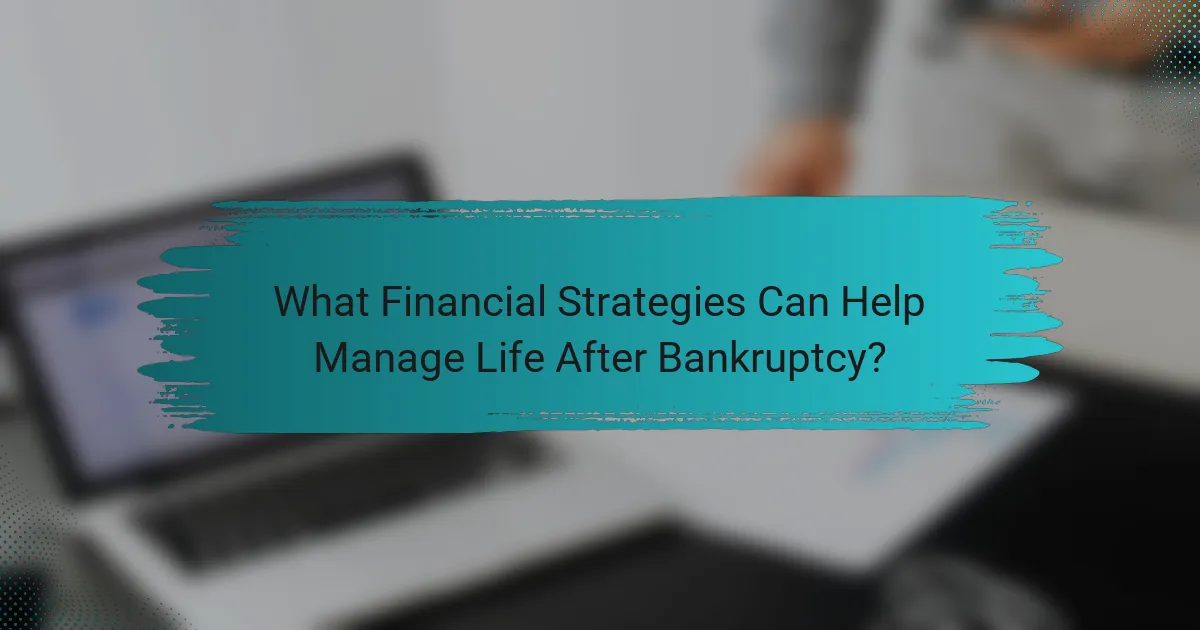
What Financial Strategies Can Help Manage Life After Bankruptcy?
Create a budget to track income and expenses. This helps in understanding cash flow. Prioritize essential expenses to ensure basic needs are met. Build an emergency fund to cover unexpected costs. Start small, aiming for at least $500 initially. Focus on rebuilding credit by making timely payments. Use secured credit cards to demonstrate responsible credit use. Consider credit counseling for professional guidance. This can provide tailored strategies for financial recovery. Explore additional income sources to improve financial stability. Part-time jobs or freelance work can supplement earnings.
What budgeting techniques are effective for individuals post-bankruptcy?
Effective budgeting techniques for individuals post-bankruptcy include the zero-based budgeting method and the envelope system. Zero-based budgeting requires individuals to allocate every dollar of income to specific expenses, savings, or debt repayment. This method helps in tracking spending and ensuring that every dollar has a purpose. The envelope system involves dividing cash into envelopes for different spending categories. This physical separation of funds can prevent overspending in any category.
Additionally, using budgeting apps can provide real-time insights into spending habits. These tools can help individuals monitor their budgets and adjust as necessary. Creating an emergency fund is also crucial. It allows individuals to manage unexpected expenses without falling back into debt. Regularly reviewing and adjusting the budget can ensure it remains relevant to changing financial situations.
Research indicates that individuals who actively engage in budgeting techniques can improve their financial stability post-bankruptcy. A study by the National Endowment for Financial Education found that structured budgeting leads to better financial outcomes.
How can individuals prioritize debt repayment after bankruptcy?
Individuals can prioritize debt repayment after bankruptcy by creating a structured repayment plan. This plan should start with identifying all debts and their terms. Next, individuals should categorize debts into secured and unsecured. Secured debts, like mortgages, typically require priority due to collateral risks. Unsecured debts, such as credit cards, can be negotiated for lower payments. Individuals should also focus on debts with the highest interest rates first. This strategy minimizes overall interest paid. Regularly reviewing and adjusting the plan is essential for financial stability. Consistent payments help rebuild credit over time.
What tools can assist in creating a sustainable budget plan?
Budgeting software can assist in creating a sustainable budget plan. Tools like Mint, YNAB (You Need A Budget), and EveryDollar provide structured budgeting features. These platforms allow users to track income and expenses easily. They help set financial goals and monitor progress over time. Additionally, many offer mobile apps for on-the-go management. Research indicates that using budgeting tools can improve financial literacy and discipline. A study by the National Endowment for Financial Education found that individuals who use budgeting tools report better financial management outcomes.
What are the best practices for maintaining financial stability after bankruptcy?
To maintain financial stability after bankruptcy, individuals should create a strict budget. This budget should prioritize essential expenses and limit discretionary spending. Building an emergency fund is crucial; experts recommend saving at least three to six months’ worth of living expenses. Individuals should also focus on rebuilding their credit score. This can be achieved by paying bills on time and using secured credit cards responsibly. Seeking financial counseling can provide valuable guidance and resources. Additionally, exploring new income sources can enhance financial security. Tracking financial progress regularly helps in identifying areas for improvement. Following these practices can lead to long-term financial stability post-bankruptcy.
How important is financial education in preventing future bankruptcy?
Financial education is crucial in preventing future bankruptcy. It equips individuals with the knowledge to manage their finances effectively. Understanding budgeting, saving, and investing can lead to better financial decisions. Studies show that individuals with financial education are less likely to incur debt. For instance, a report by the National Endowment for Financial Education found that 70% of financially educated individuals avoided bankruptcy. Additionally, financial literacy helps people recognize financial risks and opportunities. This awareness can lead to proactive financial planning. Overall, financial education significantly reduces the likelihood of bankruptcy through informed decision-making.
What resources are available for individuals seeking financial advice post-bankruptcy?
Individuals seeking financial advice post-bankruptcy can access various resources. Nonprofit credit counseling agencies provide guidance on budgeting and rebuilding credit. The National Foundation for Credit Counseling (NFCC) offers a directory of certified agencies. Additionally, financial advisors specializing in post-bankruptcy recovery can offer personalized strategies. Online platforms, such as the Federal Trade Commission (FTC) website, provide educational resources on managing finances after bankruptcy. Local community centers may also host workshops on financial literacy. These resources help individuals regain financial stability and make informed decisions.
What practical tips can individuals follow to avoid bankruptcy in the future?
Individuals can avoid bankruptcy by maintaining a budget. A budget helps track income and expenses. It enables better financial decision-making. Saving a portion of income is crucial. Aim for an emergency fund covering three to six months of expenses. Reducing unnecessary expenses improves financial stability. Prioritize paying off high-interest debts first. This reduces overall financial burden. Regularly reviewing financial goals keeps individuals on track. Seeking financial advice can provide personalized strategies. These steps collectively reduce the risk of bankruptcy.
Bankruptcy is a legal process that enables individuals to eliminate or manage their debts, impacting personal finances significantly. The article explores the different types of bankruptcy, specifically Chapter 7 and Chapter 13, detailing how each affects financial obligations and credit scores. It highlights common reasons for filing, such as medical expenses and job loss, and discusses strategies for rebuilding credit and maintaining financial stability post-bankruptcy. Additionally, it emphasizes the importance of financial education and available resources for those seeking guidance after experiencing bankruptcy.
